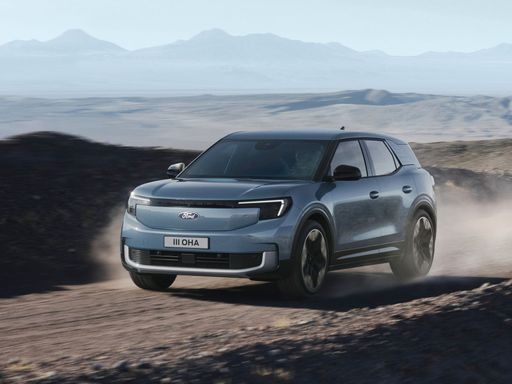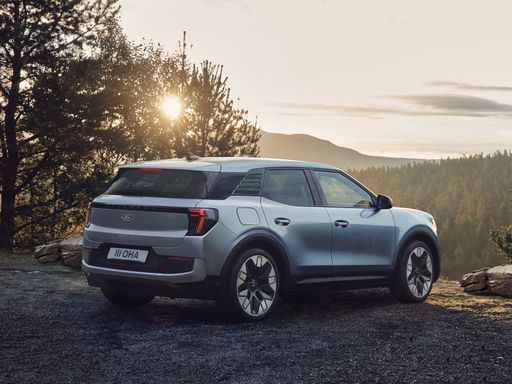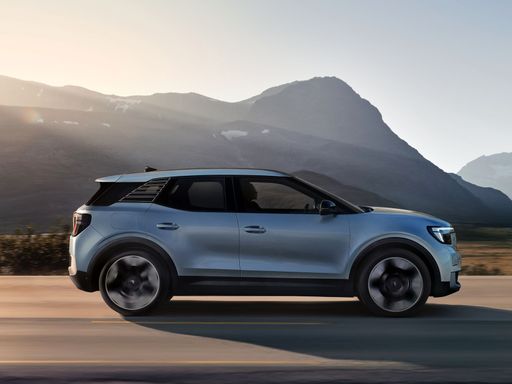Ford Explorer EV vs Hyundai Kona - Differences and prices compared
Compare performance (340 HP vs 218 HP), boot space and price (34200 £ vs 23100 £ ) at a glance. Find out which car is the better choice for you – Ford Explorer EV or Hyundai Kona?
Costs and Efficiency:
Price and efficiency are key factors when choosing a car – and this is often where the real differences emerge.
Hyundai Kona has a decisively advantage in terms of price – it starts at 23100 £ , while the Ford Explorer EV costs 34200 £ . That’s a price difference of around 11143 £.
In terms of energy consumption, the advantage goes to the Ford Explorer EV: with 14.50 kWh per 100 km, it’s minimal more efficient than the Hyundai Kona with 14.60 kWh. That’s a difference of about 0.10 kWh.
As for electric range, the Ford Explorer EV performs somewhat better – achieving up to 602 km, about 88 km more than the Hyundai Kona.
Engine and Performance:
Under the bonnet, it becomes clear which model is tuned for sportiness and which one takes the lead when you hit the accelerator.
When it comes to engine power, the Ford Explorer EV has a noticeable edge – offering 340 HP compared to 218 HP. That’s roughly 122 HP more horsepower.
In acceleration from 0 to 100 km/h, the Ford Explorer EV is clearly quicker – completing the sprint in 5.30 s, while the Hyundai Kona takes 7.80 s. That’s about 2.50 s faster.
In terms of top speed, the Hyundai Kona performs somewhat better – reaching 210 km/h, while the Ford Explorer EV tops out at 180 km/h. The difference is around 30 km/h.
There’s also a difference in torque: Ford Explorer EV pulls convincingly stronger with 679 Nm compared to 265 Nm. That’s about 414 Nm difference.
Space and Everyday Use:
Cabin size, boot volume and payload all play a role in everyday practicality. Here, comfort and flexibility make the difference.
Both vehicles offer seating for 5 people.
In curb weight, Hyundai Kona is noticeable lighter – 1370 kg compared to 1908 kg. The difference is around 538 kg.
In terms of boot space, the Hyundai Kona offers barely noticeable more room – 466 L compared to 450 L. That’s a difference of about 16 L.
In maximum load capacity, the Ford Explorer EV performs slight better – up to 1422 L, which is about 122 L more than the Hyundai Kona.
When it comes to payload, Ford Explorer EV a bit takes the win – 585 kg compared to 490 kg. That’s a difference of about 95 kg.
Who wins the race?
The Ford Explorer EV proves to be dominates this comparison and therefore becomes our DriveDuel Champion!
Ford Explorer EV is the better all-rounder in this comparison.

Ford Explorer EV
Costs and Consumption
View detailed analysis
Engine and Performance
View detailed analysis
Dimensions and Body
View detailed analysis
Ford Explorer EV
The Ford Explorer EV translates the familiar big‑American SUV presence into whisper‑quiet electric motoring, offering roomy seating and a tech‑forward cabin that will please families and road‑trippers alike. It drives with more composure than its boxy looks suggest, blending a comfortable ride and eager acceleration while undercutting the guilt of gas stops — a practical, modern alternative for buyers who want Explorer space with electric charm.
details


Hyundai Kona
The Hyundai Kona wears its personality on the outside with bold styling and sprightly handling that turns city driving into something a little more fun than a commute. It blends practical space, modern tech and sensible running costs into a compact, stylish package — a smart pick if you want flair without paying luxury prices.
details



Costs and Consumption |
|
|---|---|
|
Price
34200 - 48800 £
|
Price
23100 - 41600 £
|
|
Consumption L/100km
-
|
Consumption L/100km
4.6 - 7 L
|
|
Consumption kWh/100km
14.5 - 17.2 kWh
|
Consumption kWh/100km
14.6 - 16.8 kWh
|
|
Electric Range
360 - 602 km
|
Electric Range
377 - 514 km
|
|
Battery Capacity
52 - 79 kWh
|
Battery Capacity
1.3 - 65.4 kWh
|
|
co2
0 g/km
|
co2
0 - 163 g/km
|
|
Fuel tank capacity
-
|
Fuel tank capacity
38 - 47 L
|
Dimensions and Body |
|
|---|---|
|
Body Type
SUV
|
Body Type
SUV
|
|
Seats
5
|
Seats
5
|
|
Doors
5
|
Doors
5
|
|
Curb weight
1908 - 2179 kg
|
Curb weight
1370 - 1773 kg
|
|
Trunk capacity
445 - 450 L
|
Trunk capacity
466 L
|
|
Length
4468 mm
|
Length
4350 - 4385 mm
|
|
Width
1871 mm
|
Width
1825 mm
|
|
Height
1630 - 1639 mm
|
Height
1580 - 1585 mm
|
|
Max trunk capacity
1417 - 1422 L
|
Max trunk capacity
1300 L
|
|
Payload
561 - 585 kg
|
Payload
420 - 490 kg
|
Engine and Performance |
|
|---|---|
|
Engine Type
Electric
|
Engine Type
Electric, Petrol, Full Hybrid
|
|
Transmission
Automatic
|
Transmission
Automatic, Manuel
|
|
Transmission Detail
Reduction Gearbox
|
Transmission Detail
Reduction Gearbox, Manual Gearbox, Dual-Clutch Automatic
|
|
Drive Type
Rear-Wheel Drive, All-Wheel Drive
|
Drive Type
Front-Wheel Drive, All-Wheel Drive
|
|
Power HP
170 - 340 HP
|
Power HP
115 - 218 HP
|
|
Acceleration 0-100km/h
5.3 - 8.7 s
|
Acceleration 0-100km/h
7.8 - 11.9 s
|
|
Max Speed
160 - 180 km/h
|
Max Speed
162 - 210 km/h
|
|
Torque
310 - 679 Nm
|
Torque
200 - 265 Nm
|
|
Number of Cylinders
-
|
Number of Cylinders
3 - 4
|
|
Power kW
125 - 250 kW
|
Power kW
85 - 160 kW
|
|
Engine capacity
-
|
Engine capacity
998 - 1598 cm3
|
General |
|
|---|---|
|
Model Year
2024 - 2025
|
Model Year
2024 - 2025
|
|
CO2 Efficiency Class
A
|
CO2 Efficiency Class
A, D, C, E, F
|
|
Brand
Ford
|
Brand
Hyundai
|
What drive types are available for the Ford Explorer EV?
The Ford Explorer EV is available as Rear-Wheel Drive or All-Wheel Drive.




